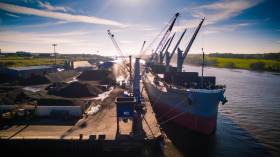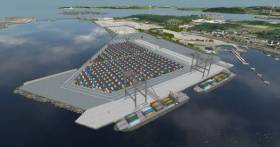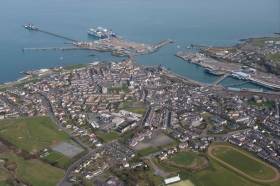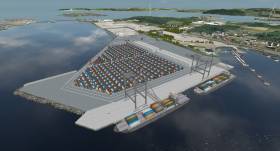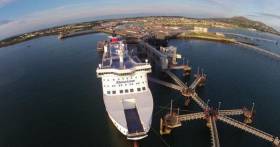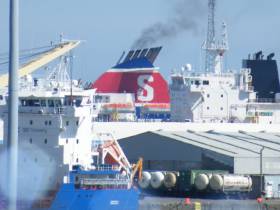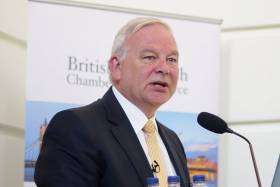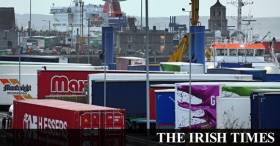Displaying items by tag: Brexit
Record Turnover Announced at Foyle Port Despite Brexit Uncertainty
It has been announced that Foyleport had a record £10 million in turnover despite the uncertainty posed by Brexit.
The Derry harbour, reports The Irish News, recorded an operating profit of £1.9m during 2018/19, marking its seventh year of consecutive growth.
The record turnover followed the port's handling of record levels of animal feed and fertiliser.
It means that all three of the north's ports have reported growth in the past year.
In June, Warrenpoint Port said its turnover rose by 5.5 per cent to £6.1m during 2018.
Further reading on the story can be found here.
The Port of Cork CEO Brendan Keating has warned that investment in shipping infrastructure is key to offsetting the effects of Brexit in the southern region of the country.
As EchoLive reports, Mr Keating told the Construction Industry Federation Southern Construct conference that the Port, which had a €35.4 million turnover in 2018, will be hit by Brexit with decreased agricultural activity projected and a reduction of dry bulk goods being shipped and must adapt to new trends in international shipping.
“The region is highly dependent on international growth in the achievement of economic growth and highly dependent on international shipping,” Mr Keating said.
“We must continue to invest in port infrastructure,” he added.
For more click here from the newspaper.
Brexit: Demands for No-Deal Over Fears of Impact On Port of Holyhead
In north Wales, town councillors in Holyhead, have urged the government to think again about letting Britain crash out of Europe with no deal.
Fearing the impact of a clean break from the European Union, NorthWalesLive writes, that members of Holyhead Town Council have passed a motion urging the Prime Minister to act in the interests of such ports and secure a deal with Brussels.
The Port of Holyhead is the second largest (ferry)port in the UK (after Dover), handling two million passengers, half a million vehicles and 450,000 freight units a year with the Swedish company employing hundreds of workers in North Wales.
During a recent visit to the port Michael Gove, the minister in charge of Government preparation for no-deal, said that ports are “geared up” for Brexit and should avoid any significant delays and congestion.
But Stena Line, which is the town’s largest employer, has described leaving with no-deal and no trade agreement as “the worst of all possible scenarios.”
Clck here for more on the story.
A doubling in the size of the customs building the Irish Examiner reports is planned by the Port of Cork at its Ringaskiddy terminal due to the increasing likelihood of a hard Brexit.
“We have to plan for the worst now at this stage,” said Port of Cork chief executive Brendan Keating.
Already, a large number of HGVs from the North use ferry connections from Cork to get to Brittany in France and Santander in Spain. If a hard Brexit occurs, it is likely that increased HGV traffic will use the routes out of Cork.
The Port of Cork is investing €85m in developing expanded cargo-handling facilities at its deepwater terminal Ringaskiddy. It has successfully applied to Bord Pleanála to increase the size of a previously permitted customs’ inspection building at Ringaskiddy from 324sq m to 648sq m, primarily in light of the uncertainty over Brexit.
“We have to have the capability to put the necessary checks in place,” Mr Keating said, adding that, if a hard Brexit occurs, there is likely to be more demand for freight and cargo to transit via Dublin and Rosslare ports as well.
The newspaper has more here
Europort: Is Rosslare Ready for Brexit?
The WexfordPeople writes, following his visit to Wexford to officially open the M11 Gorey to Enniscorthy bypass, pictures were circulated of a smiling Taoiseach Leo Varadkar meeting with representatives at Rosslare Europort.
Having shed his tie after a long day, there were smiles nonetheless as he was shown around the Port which he's publicly stated as being key to post-Brexit Ireland.
However, decades of neglect means getting things up to code is a mammoth task, particularly with a Brexit deadline of October looming large. With a €320million expansion plan being outlined for Dublin Port, critics have accused the government of merely paying lip-service to Rosslare and are not holding out too much hope that it will get the shot in the arm it needs.
General Manager at the port Glenn Carr, however, remains firm that Brexit should represent an opportunity for Rosslare.
More on the story can be read through this link.
Ferry Operator Gives Holyhead Free Port Verdict But Has This Message for UK Government
The port authority in Holyhead, Stena Line says free port status for the town could bring "immediate opportunities" but also had a message for UK Government.
The ferry giant according to NorthWalesLive, was commenting after Boris Johnson's Government unveiled plans for 10 free ports across the UK after Brexit.
They allow firms to import goods and then re-export them outside of normal tax and customs rules.
While Stena said free port status could bring benefits, their message to the UK Government was that reaching a deal with the EU remains the "best possible solution".
Ian Hampton, Stena Line Brexit spokesperson, said: "Holyhead is the second largest roro port in the UK and the largest port facility owned by the Stena Line Group, so naturally the Company is currently seeking further clarification from the UK Government on all the proposals that are being issued to help ensure the prosperity of the UK in a post-Brexit era.
For further reading on this development click here.
Almost €8 million, The Irish Times reports, has been spent by the State buying land and developing properties at Dublin Port, Dublin airport and Rosslare Europort for border checks post-Brexit.
Paschal Donohoe the Minister for Public Expenditure and Reform said the Office of Public Works (OPW) has spent €7.8 million to date on acquiring and developing physical infrastructure for use at the two ports and the airport.
The Minister revealed the spending on infrastructure for a no-deal Brexit in response to a parliamentary question tabled by Fianna Fáil’s finance spokesman Michael McGrath.
The State has taken control of a 13,000sq m warehouse at Dublin Port previously owned by businessman Harry Crosbie, and purchased 16 acres outside Rosslare port that was owned by car dealer Bill Cullen.
Both men lost control of the properties in the financial crash. Mr Donohoe did not provide a breakdown of the State’s spending on the individual properties.
The State fast-tracked the takeover of the former Crosbie warehouse and the Rosslare property for inspections of goods and containers should the UK leave the EU without a deal on March 31st. The Brexit date has since been extended until October 31st.
To continue reading more on Control Post click here.
As the Irish Examiner writes the Port of Cork is poised to set up a special "border control" facility to help ease congestion at Dublin and Rosslare should Britain crash out of the EU.
A British-Irish Chamber of Commerce meeting in Cork heard from the port's chief executive Brendan Keating, who said it was stepping up its plans to handle more traffic. "We are seeking to develop what is called a border control point. Dublin has built one and is prepared for a worst-case scenario hard Brexit. Rosslare is ready. We are about to start preparation on one to facilitate inspections of products coming to and from the country.
"We are doing it because the Government is somewhat concerned that with congestion in Dublin and Rosslare, other ports will have to kick in and facilitate trade movement. We are next and we will prepare. We will be ready in time," Mr Keating said.
The Port of Cork was somewhat insulated from a hard Brexit because its business is less dependant on daily trade across the Irish Sea. As a "lift-on, lift-off" port, it hoped to grow its market share from 20% to 25% once the multimillion redevelopment of Ringaskiddy is completed, Mr Keating said.
Click here for more on the story.
#ferries - The Port of Holyhead has shown “no sense of emergency” about Brexit, while Dublin Port bemoaned the huge expense preparing for a no-deal exit that might not happen, the British-Irish Parliamentary Assembly heard.
As The Irish Times writes at the biannual gathering of Irish and UK parliamentarians heard details of a report from one of its committees on a visit to the two Irish Sea ports by a delegation from the assembly to assess preparations for Brexit.
The committee painted a contrasting picture on preparations being taken in Dublin and Holyhead.
Darren Millar, a Conservative member of the Welsh national assembly, said that Dublin Port officials expressed concern about the number of customs officials that still needed to be hired to deal with a potential no-deal Brexit.
“Our biggest concern was that there was huge effort and huge expense going into these things and they may not be required,” he said on Tuesday, the second day of the assembly at Druids Glen in Co Wicklow.
Further reading on this story can be read through this link.
Europort in A Storm - Rosslare Out to Catch Brexit Tide
#ferries - At the end of last year Irish Continental Group (ICG) announced its decision not to run its Irish Ferries services this summer to France from Rosslare, Co Wexford, the move was met with both surprise and shock in the south-east port.
After all, the Irish Independent writes, the company's new 'cruise ferry', the WB Yeats, which can carry more than 1,800 passengers and 1,200 vehicles, had just arrived in Ireland after a delay and there were great expectations that ICG would put the ship on its Rosslare to Cherbourg, France route.
Instead, ICG decided to operate the ferry service from Dublin Port to Cherbourg, lured by the scope for additional business in the capital.
Irish Ferries is still operating its Rosslare-to-Pembroke service while Stena runs from the south eastern port to Fishguard as well as to Cherbourg.
But if many were stunned by the move, for some in the Rosslare business community it was a progression for Irish Ferries that should have been anticipated.
According to Damien Roche, managing director of Rosslare-based Roche Logistics Group, which he co-owns with his brother Conor, it was simply a numbers game for ICG.
To read much more on the ferryport click here.
Afloat.ie adds Irish Ferries decision last year to abandon Rosslare also involved a second route to France, Roscoff in Brittany which was only operated in the peak-season summer months. This leaves Brittany Ferries as the sole operator maintaining an Ireland-Brittany link on the Cork-Roscoff route which is experiencing a passenger boost.



























